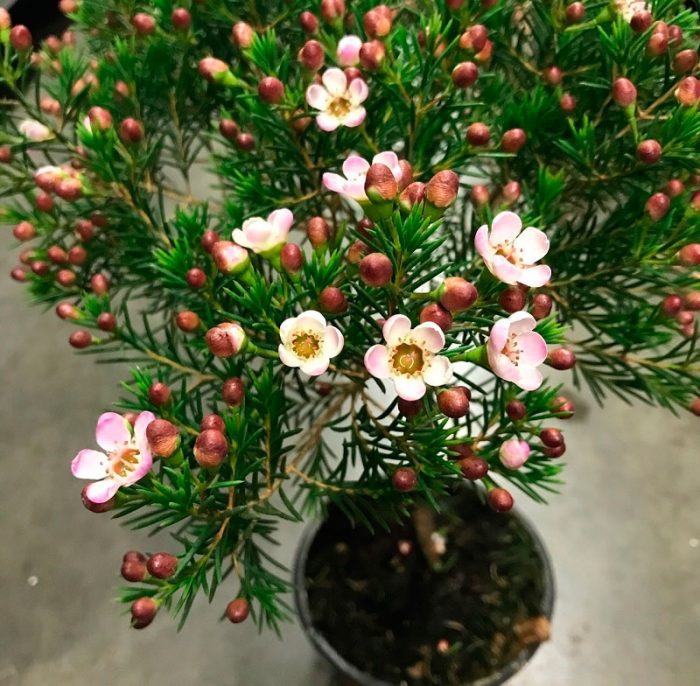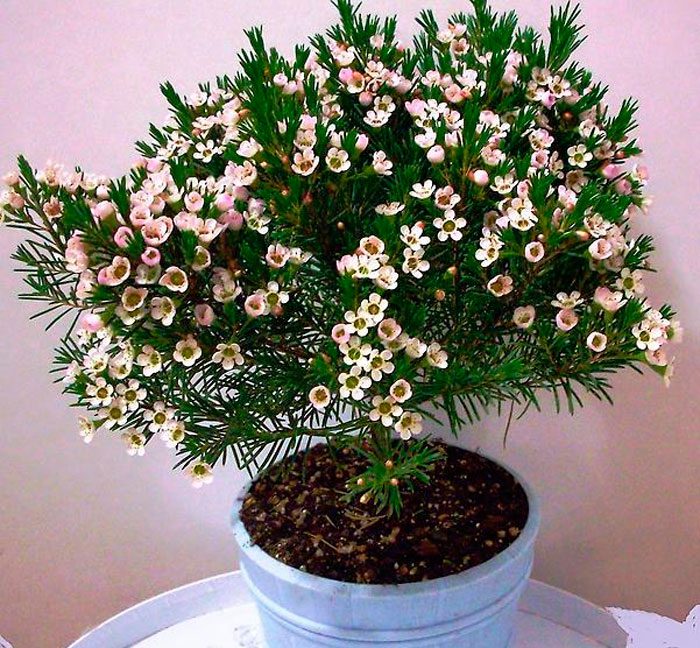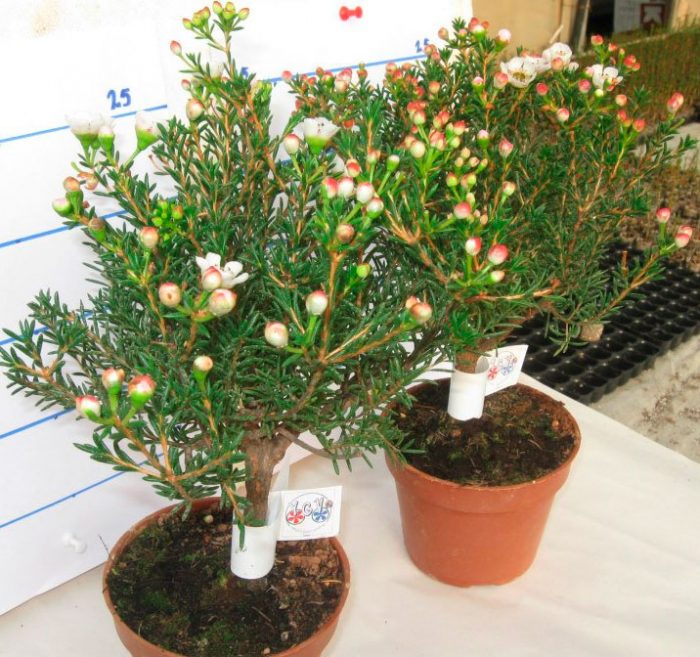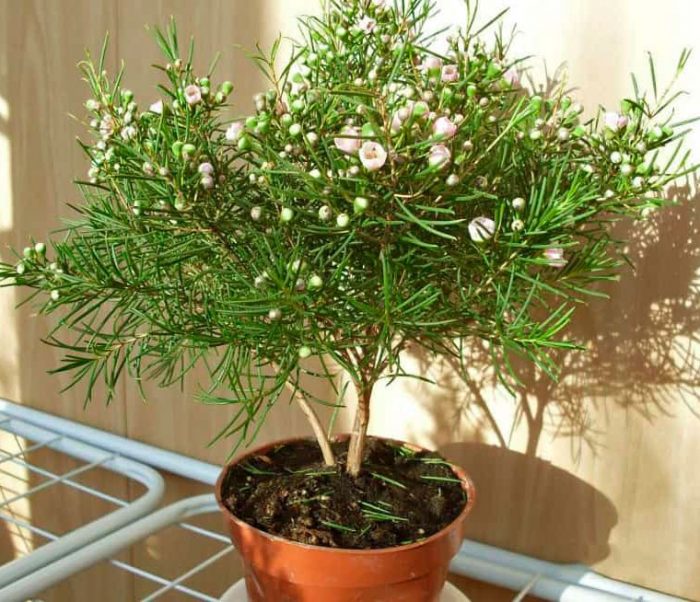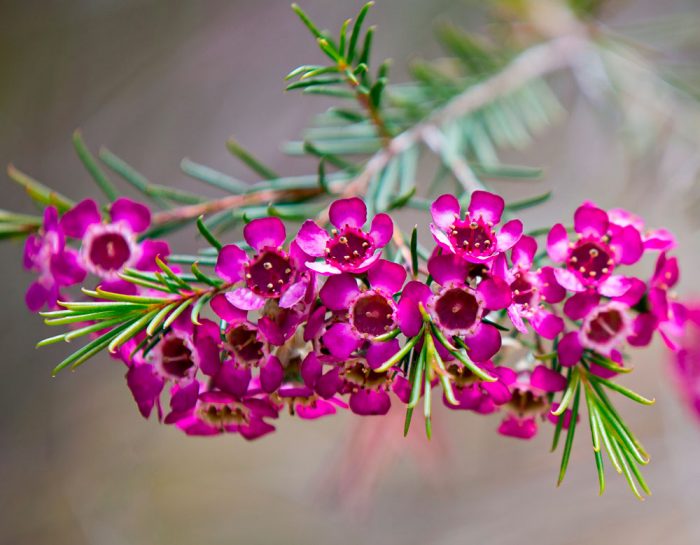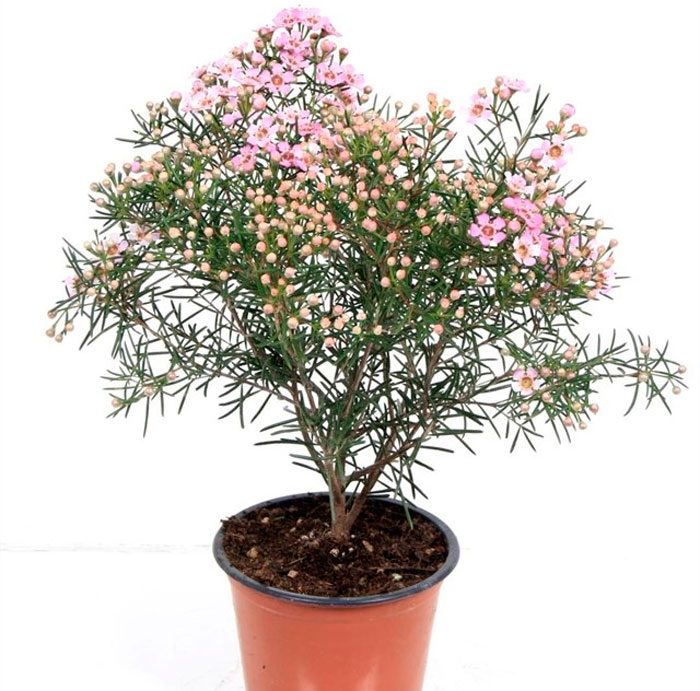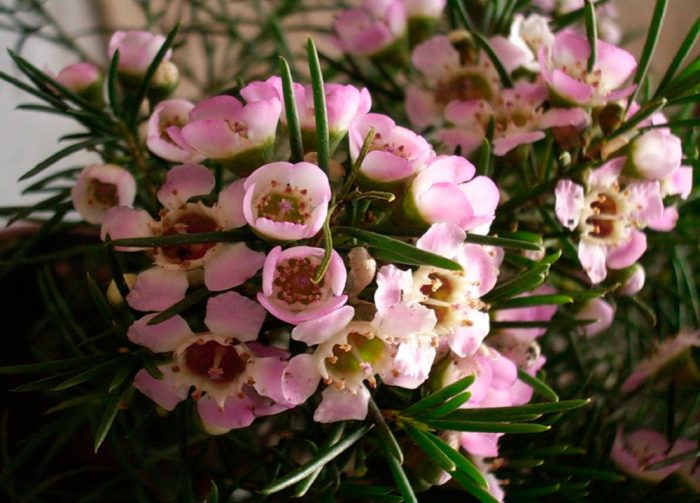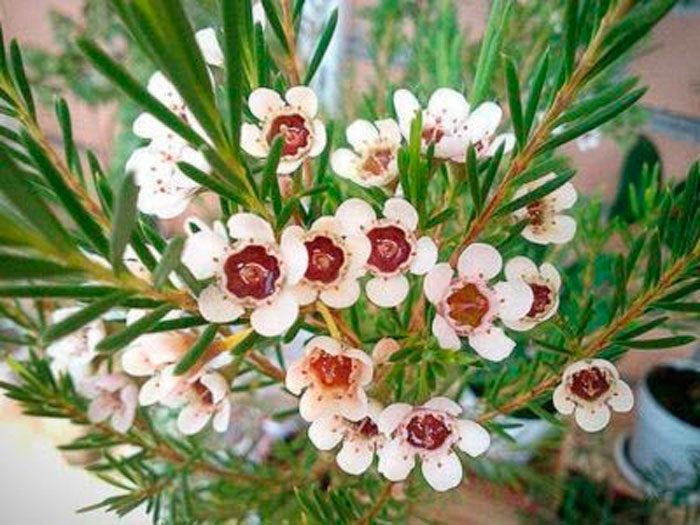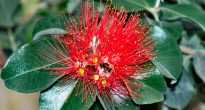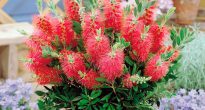Hamelaceum wax myrtle is a plant native to Australia that belongs to the Myrtle family. This genus has 14 species, which are represented by evergreen shrubs, in nature they can be found in the southwestern part of Australia. Hamelacium naturally prefers to grow on sandy wastelands and rocky slopes.
Depending on the species, the height of the bush can vary from 0.3 to 3 m. It is decorated with leaves that remain dark green throughout the year. Rounded flowers, reaching 1.5–2 cm in diameter, can be colored purple, white, pinkish or red. The bush blooms already at the end of winter and often fades only in the last summer days.
Home care for chamelacium
Chamelacium wax myrtle is an evergreen plant that can be grown as a compact shrub or as a small tree. But in order for the bush to grow healthy and delight the grower with regular flowering, it must be properly looked after and it must be provided with optimal conditions for growth.
Hamelacyum experts refer to those plants that are very difficult to grow at home. He is highly sensitive to any changes in growing conditions or an unsuitable environment for him, and reacts very negatively to this. And in time to understand that the bush is sick or to identify the reasons for its growth retardation, only an experienced grower can. If you nevertheless decide to decorate your house with chamelacium, then even choosing it in the store should be taken with great responsibility. Please note that the bush must be absolutely healthy, only in this case it will be able to endure the move and get used to the new growing conditions. Carefully examine the plant, its buds should not be wrinkled, and dark spots on the leaves and their flying around indicate that the bush has problems. Also pay attention to the potting medium, it should not be too dry or too wet.
Care after purchase
The newly purchased flower is not transplanted. Instead, they take a tall plastic bag, which is sprayed with dichlorvos from the inside. Place the bag over the bush without tying it. If an unpleasant odor appears during this procedure, then the bag is carefully lowered to the lower branches.Remove the plant covered with a bag for 24 hours in a well-lit but cool (13 to 15 degrees) place. Then the bush is sprayed with a warm solution of honey (for 1 liter of water, take 2 teaspoons of honey). The package is completely removed after three or four days, the surface layer of the soil mixture in the container is also removed, and it is replaced with humus. In the event that the bush in the store grew in a very small container, then transplant it by transferring it into a more spacious pot, and try to keep the earthen lump intact. In order for the bush to grow and develop normally, it must be placed together with the pot in a deep pan, which is pre-filled with wet expanded clay.
Watering
When growing indoor chamelacium, special attention should be paid to watering it during the warm season. At this time, the plant needs regular, abundant watering, for which soft and well-settled water is used. However, you need to water the bush very carefully, since it reacts extremely negatively to stagnant liquid in the soil mixture. Remember that even overdrying an earthen coma will cause less damage to the plant than stagnant moisture in the pot. But overdrying the substrate is also highly discouraged, since because of this, the delicate root system can be severely affected, and foliage can generally fly around. In order for the shrub to grow and develop better, the water for irrigation must be acidified; for this, a small amount of citric acid or vinegar is added to it.
Suitable substrate
The soil mixture must be used slightly acidic and loose, and it must also pass water and air well, which will help to avoid stagnation of moisture in the root system. Best suited for growing this plant is a mixture of the following composition: peat, humus, river coarse sand, sod and leafy soil (taken in equal parts). To avoid overdrying the soil mixture in a pot, a hydrogel is poured into it or cut sphagnum is added.
Chamelacium transplant
Chamelacium is not often transplanted, or rather, it should be done regularly once every three years. The best time to transplant is spring. This plant has thin and very fragile roots, which can be injured during transplantation, which is extremely undesirable to allow. That is why the bush is transplanted only when its root system becomes very crowded in the container. To do this, it is very carefully pulled out of the old pot, while trying not to destroy the earthen lump. The plant is then carefully placed in a new pot, which should only be slightly larger than the old one. For growing indoor chamelacium, it is recommended to use a ceramic pot and it is better if it is unglazed. The fact is that often in order to safely remove the root system from the container, the latter must be carefully broken.
Top dressing
The plant is fed regularly once every 15–20 days throughout the growing season. Fertilizer is used that does not contain lime. Before the bush blooms, it is fed with potassium-nitrogen fertilizers, and during the flowering period - with potassium and phosphorus.
Pruning
Such a shrub is cut off regularly at the end of flowering, in this case the stems are shortened by a third. Since chamelacium is very fast growing, soon its stems will grow back. To make the shrub grow more lush and branchy, at a young age, the tops of the branches are pinched at it.
Winter care
In autumn, the wax myrtle is moved to a cooler room, where the air temperature is about 15 degrees. Thanks to the cool wintering, the bush will bloom effectively and magnificently. Such a shrub is very photophilous, and even in winter it needs a lot of light. Therefore, in the cold season, he will need additional daily supplementary lighting, and the optimal daylight hours for such a culture is 12 hours.In winter, you do not need to feed the plant, and you should also definitely reduce the number and volume of watering.
Reproduction methods
It is very difficult to grow wax myrtle from seeds, but if you still have seedlings, then there is a high probability that they will die over time. Because of this, the reproduction of such a shrub by cuttings is most popular with flower growers. The fact is that this method is not only easier and faster, but it also preserves the characteristics of the parent plant. Harvesting of apical cuttings is carried out in January, in length they should reach 7.5-10 cm. Then they are treated with an agent that stimulates the growth of roots and planted for rooting in a mixture of sand and peat. Roots appear on cuttings after about 8 weeks.
Diseases and pests
Chamelacium contains a large amount of essential oils, which makes it highly resistant to many diseases and pests. But such a plant can still be affected by late blight. The occurrence of this disease is facilitated by the stagnation of water in the substrate. At the first sign of phytophthora, the bush is sprayed with one of the fungicidal agents. In the spring-summer period, aphids can settle on the plant, damaging both foliage and inflorescences. To get rid of such a pest, insecticidal preparations are used. Also, at any time of the year, the shrub can be affected by powdery mildew, in order to protect it from such a disease, it should be provided with proper care.
Also, gray rot can harm the foliage of the chamelacium. A favorable condition for the development of such a disease is warmth with a high level of air humidity. As soon as the first signs of gray rot are found, it is necessary to immediately begin to fight this disease, since it can destroy the plant in the shortest possible time. To cure a bush affected by gray rot, it is sprayed with a fungicide.
Types of chamelacium
Chamelacium hooked
In indoor conditions, only one species is grown, called hooked chamelacium, or wax myrtle chamelacium. Such a plant is fast-growing, so in nature it can reach a height of up to 250 centimeters. However, at home, the shrub grows lower, and it is often cut to make it compact. The length of the leaf plates varies from 25 to 40 mm, they densely cover the shoots and outwardly look like needles. Over time, as the branches mature, the leaves fly around. Flowers reach 10–20 mm in diameter, they are single or can be collected in tassels. The flowers have a very pleasant scent. Thanks to the diligent work of breeders, many varieties of chamelatium wax myrtle were born, they differ not only in shape (semi-double and double), but also in the color of flowers: yellow, red, white and even two-colored.
Hamelacyum snowflake
The height of the bush does not exceed 0.4 m, it is decorated with white or pink flowers. This type is used to create bouquets and flower arrangements.
Hamelacyum orchids
A short bush of this species does not have such lush foliage as chamelacium wax myrtle. However, during flowering, it is decorated with many inflorescences, painted in lilac and pink, and their centers have a beetroot tint.
Chamelacium white
The bush can reach a height of up to half a meter, its bright green leaf plates have a slightly elongated shape. During flowering, the plant is decorated with light pink or white bell-shaped flowers.


Watch this video on YouTube

